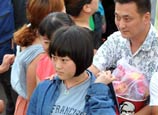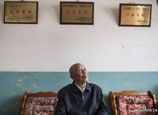
 |
| Feng Xiaogang (right) speaks with Zhao Benshan at Friday's press conference. (GT) |
It was officially announced last Friday that renowned movie director Feng Xiaogang would head the creative team for China Central Television's (CCTV) Spring Festival Gala.
As an annual fixture of traditional New Year events for most Chinese families, the CCTV Spring Festival Gala, or chunwan, has dominated the audience ratings among all the TV programs during the holiday for 30 years, with many of the elements, such as the show's style, comedians, singers and the hosts and hostesses remaining unchanged.
Feng's notoriety is enough to cause a wave of excitement across social media platforms, but this is also the first time for CCTV to hire an "outsider." And even though he is a famous movie director, he has no experience directing live stage works.
So, is Feng the right person to helm the Gala team? Will he revolutionize the traditional gala, or will he be just an adviser with no actual power over the strict censorship?
Off its peak
When it began in 1983, the CCTV Spring Festival Gala was a milestone for Chinese entertainment TV programs. It was the first ever nation-wide live show on air for the Spring Festival. It boasted various types of performances such as singing, dancing, crosstalk, poem reading, acrobatics, and more.
The types of programs presented in the first decade, when Chinese people still suffered from a lack of cultural life, were gradually formed, but things improved steadily in 1990s. Some singers from Hong Kong and Taiwan, such as Zhang Mingmin and Philips Kris, came to Spring Festival Gala and left strong impressions on mainland audiences that have not faded even today.
After the first sketch comedy appeared on the Spring Festival Gala in 1984, this type of performance developed rapidly and often made headlines after the Gala in 1990s and early 2000s. That was when the Gala had reached its peak.
However, its popularity has declined in recent years as Internet users scorn the show for being rigid and outdated and lacking a grass-roots foundation.
In a study conducted by qq.com in 2011, over 40 percent of those surveyed liked the gala that year while approximately the same number said they disliked it.
According to CSM Media Research, the audience rating has dropped down in recent years: 18.344 percent in 2011, 17.37 percent in 2012 and 11.362 percent in 2013. Though the number of people who watch the programs online impact the data, the voting participation online also declined sharply.

















 College student car models show youthful vigor
College student car models show youthful vigor


![]()
